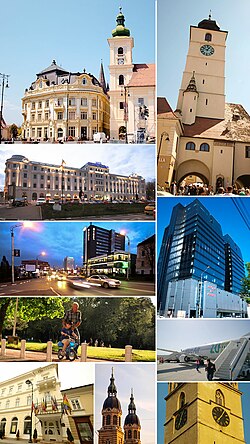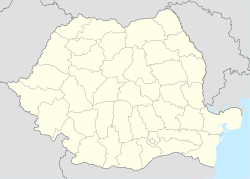Nagyszeben
|
Sibiu Hermannstadt / Nagyszeben |
||
|---|---|---|
| City | ||
 |
||
|
||
 Administrative territory of Sibiu in Sibiu County |
||
| Administrative territory of Sibiu in Sibiu County | ||
| Coordinates: 45°47′34″N 24°09′07″E / 45.79278°N 24.15194°ECoordinates: 45°47′34″N 24°09′07″E / 45.79278°N 24.15194°E | ||
| Country | Romania | |
| County | Sibiu | |
| Founded | 1191 (first official record) | |
| Government | ||
| • Mayor | Astrid Fodor (FDGR) | |
| Area | ||
| • Total | 121 km2 (47 sq mi) | |
| Elevation | 415 m (1,362 ft) | |
| Population (2011 census) | ||
| • Total | 147,245 | |
| • Density | 1,132/km2 (2,930/sq mi) | |
| Time zone | EET (UTC+2) | |
| • Summer (DST) | EEST (UTC+3) | |
| Postal Code | 55xxxx | |
| Area code(s) | +40 269/369 | |
| Car Plates | SB | |
| Website | www |
|
Sibiu (Romanian pronunciation: [siˈbiw], antiquated Sibiiu; German: Hermannstadt [ˈhɛʁmanʃtat], Transylvanian Saxon dialect: Härmeschtat, Hungarian: Nagyszeben [ˈnɒɟsɛbɛn]) is a city in Transylvania, Romania, with a population of 147,245. Located some 215 km (134 mi) north-west of Bucharest, the city straddles the Cibin River, a tributary of the river Olt. Now the capital of Sibiu County, between 1692 and 1791 and 1849–65 Sibiu was the capital of the , until 1920 it belonged to the Kingdom of Hungary.
Sibiu is one of the most important cultural centres of Romania and was designated the European Capital of Culture for the year 2007, along with the city of Luxembourg. Formerly the centre of the Transylvanian Saxons, the old city of Sibiu was ranked as "Europe's 8th-most idyllic place to live" by Forbes in 2008.
The city administers the Păltiniș ski resort.
The first official record referring to the Sibiu area comes from 1191, when Pope Celestine III confirmed the existence of the free prepositure of the German settlers in Transylvania, the prepositure having its headquarters in Sibiu, named Cibinium at that time.
...
Wikipedia


